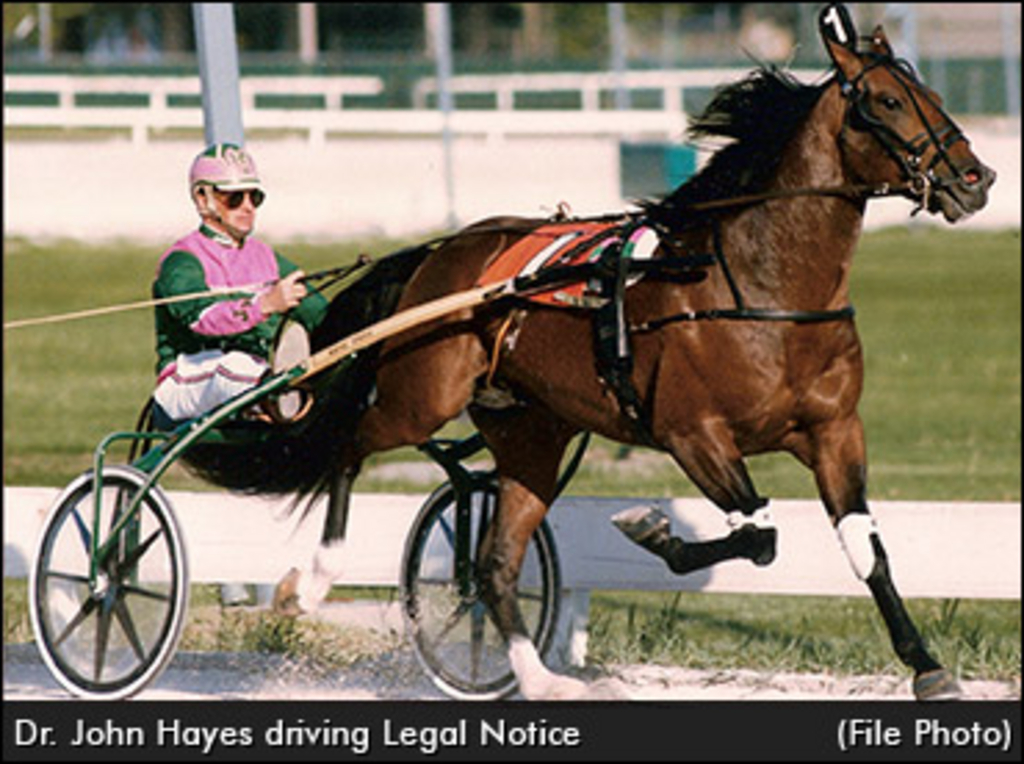The Quotable Dr. John Hayes


 What does it feel like to drive a horse to victory in a major stakes race? Dr. John Hayes said coming from 10th at the top of the stretch to win the 1981 Meadowlands Pace with Conquered is a feeling he can only compare with finishing his first Boston Marathon.
What does it feel like to drive a horse to victory in a major stakes race? Dr. John Hayes said coming from 10th at the top of the stretch to win the 1981 Meadowlands Pace with Conquered is a feeling he can only compare with finishing his first Boston Marathon.
“It was totally emotionally impacting. It was so overwhelming I had trouble controlling it,” he said Wednesday, referring to the marathon he completed on his first attempt in 2007.
As for that equally overwhelming Meadowlands Pace victory, Hayes said, “At the head of the stretch I was out of it. Halfway through the stretch it was evident I was going to be in the hunt for a cheque. Down near the wire, the cheque was going to be pretty good and at the wire, holy f---.
“It was that first 30 seconds from the horse crossing the finish line until you get down into the turn and the horse gets pulled up; that feeling I never experienced it to that extent before in my life.”
Hayes has done it all in harness racing. He’s a veterinarian that has owned, trained and driven horses all of his adult life. While he’s retired from training and his farm on the shore of Lake Ontario in Beamsville is for sale, it is still home to Canadian Pacing Derby champion Modern Legend trained by Dave Drew.
Hayes has long been one of the sport’s most respected, most articulate participants. When asked to describe the sensation of driving horses, he said it doesn’t feel like you might expect.
“Something you’re acutely aware of is how fast the ground is going underneath you when you’re driving a horse,” he said. “That sense is, of course, nothing you can compare to because it is being in the car without the floorboards.
“Lots of times there is that addition of physiology of the horse that impacts on you. You smell the horse. There’s sweat involved. You’re getting that added sensory input that doesn’t come from another moving-over-the-ground experience.”
Nearly 50 years of experience has taught Hayes to understand the language horses speak.
“Although horses don’t talk, they certainly communicate. I became much better at speaking horse speak incrementally as time went on,” he said. “The language is in their response to the inputs that are from your end. In other words, you just get more comfortable in identifying the feedback and what it probably means.”
As for people he admires in the game, Hayes said he’s a big fan of fellow veterinarian Dr. Ted Clarke, the general manager of Grand River Raceway in Elora. Clarke was inducted into the Canadian Horse Racing Hall of Fame in August.
“If Ted Clarke had a greater responsibility for the direction of Canadian racing, we would be way, way down the road to optimal opportunity,” Hayes said. “He has the ability to create consensus like nobody I’ve seen. He does not make vested interest his primary objective. He makes the interest of everybody his primary objective with the assumption that vested interest will be best served.”
Hayes no longer owns any horses, but he was quick to name the one that changed his life.
“The horse’s name is Decked. Let’s just say it was a father-son relationship thing,” he said of the late John Hayes, Sr., who is enshrined in the Canadian Horse Racing Hall of Fame.
“Father was cutting back, phasing out and I was taking over the operation … Of course, I was young and wanting to expand my wings and there was no opportunity to do it with a trotter. So, we had this two-year-old who was by the first crop of Penn Hanover called Decked. His mother was an Adios mare. She was from the last crop of Adios. He was made to pace, but he loved to trot.
“Father said, ‘You can hold him together in 2:20, but he’s bred to pace and he’ll switch over to the pace as soon as you chirp to him going some speed …’ The bottom line is he won his first pari-mutuel start, in London, in a sires stakes on the trot in 2:09 in October. That was the day that I somewhat gained a level of independence from my father where I was able to make a decision and he didn’t have to tell me I was full of (it).”
In six years on the track, Decked earned more than $140,000 on the trot and just $4,000 on the pace.
To hear the conversation with Dr. John Hayes — including what his personal heaven is like — check out Grand River Raceway's weekly podcast, the Harness Racing Report, produced for Grand River Raceway by award-winning journalist Dave Briggs, by clicking the orange play button below:

